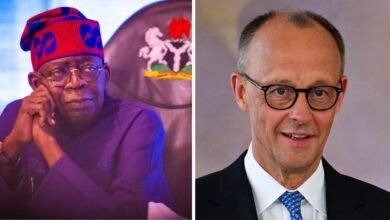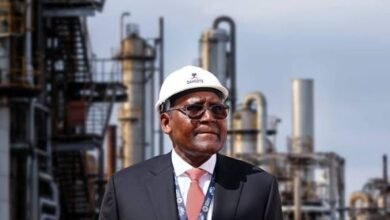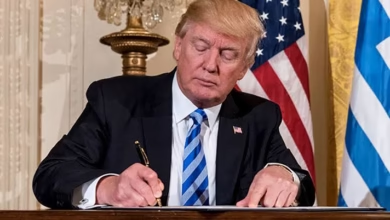Economy
10 Things Mr. Wale Edun Said About Nigeria’s Economy

Nigeria’s Minister of Finance and Coordinating Minister of the Economy, Mr. Wale Edun spoke with the London-based African Business Magazine on the plans of the President Bola Ahmed Tinubu’s administration to turn-around the Nigerian economy.
In his interview he expresses optimism that the government is on the right track and making the right decisions that would reap benefits in both the short and long term.
Here are 10 major highlights from that interview:
1. He is optimistic about Nigeria’s economic trajectory and that Nigeria will experience economic stability in 2025:
“Without any doubt, I am very optimistic about our nation’s economic trajectory, not only in 2025 but beyond. In the year ahead we expect to see an acceleration of economic growth coupled with a reduction in the rate of increase of prices. These expectations are reflected in the Medium Term Expenditure Framework and the Fiscal Strategy Paper approved by the legislature. It is noteworthy that we are not the only ones who have this expectation. Projections provided by the International Monetary Fund (IMF), the World Bank and other forecasters agree that growth will improve and inflation will slow. In 2025, the issues around economic stability will be largely resolved.”
2. One of his goals for 2025 is to reduce inflation, and keep it low. He wants the prices of things to go down. He also says that inflation is dropping due to some of the policies and initiatives of the government that are working:
“Perhaps the biggest issue with stabilising our economy is to reduce inflation and keep it low. We are clear that very significant progress will be achieved in this regard in the months ahead. If nothing else, we expect the downward path of fuel prices, a major element in stoking higher prices, to continue. The current downward trend results from the combination of enhanced domestic refining capacity provided by the Dangote refinery, stable exchange rate, and our policy to sell crude oil to domestic refiners in naira. These have all contributed to the turnaround in fuel prices. We expect to see further reductions in the year ahead as the combination of factors above is further strengthened by additional refining capacity from government-owned refineries and the BUA Group becoming effective. We also expect a significantly slower increase in food prices to contribute to lower inflation.”
3. Mr. Edun notes that these reforms were inevitable if the administration was going to unlock value from the economy. While according to him: “the costs must be borne before the benefits manifest,” the biggest worry of the administration is the welfare of the vulnerable:
“The reforms, as we have always contended, were inevitable if we are to unlock the potentials of this country and make the growth and development progress we need. The challenge with reforms of this nature is that the costs must be borne before the benefits manifest. Our biggest and ongoing challenge in this regard lies in ensuring adequate protection for vulnerable fellow Nigerians. Though now improving, this has been an uphill task – made more onerous by the absence of a universally acceptable database. We are however now finding resolution to the various issues that have dogged the acceptance of the database of vulnerable Nigerians. Our direct benefit transfers have now reached approximately 20m Nigerians. We expect to make even more rapid progress in these disbursements in Q1 2025.”
He further says that:
“In the immediate term we will concentrate on addressing our pain points around enabling protection for vulnerable citizens, sharply improving food supply, reducing costs, and supporting key sectors to grow even faster than they are presently doing.”
4.The President Bola Tinubu administration is working to build trust and the confidence of both domestic and foreign stakeholders, while deploying measures to ensure transparency of government financial transactions:
“Building trust capital is fundamental to restoring the confidence of all stakeholders – domestic or foreign. Before dealing with the issue of foreign exchange reserves, it is important to draw attention to some of the measures taken to ensure transparency and predictability: deploying technology towards eliminating leakages and opaqueness in government financial transactions. We have seen a significant reduction in leakages.”
5. As at December 2024, Nigeria’s foreign reserves stood at $42bn. Mr Edun argues that this growth is as a result of the government not paying fuel subsidies, among other factors.:
“Foreign reserves stood at $42bn on 14 December. While this is an area for CBN commentary, I am happy to see the steady improvement in our reserves. This is perhaps not surprising given that the surplus on our current account balance has continued to improve with portfolio investor inflows and remittances.
It is noteworthy that the reserves have continued to grow in a year when, until recently, payment of fuel subsidies meant that the CBN was not a direct beneficiary of proceeds from crude oil exports. It is important to state that our expectation of improvements in crude oil production will improve the availability of foreign exchange to the economy. It is also important to draw attention to the emerging oil refining sector of our economy and its potential for improving both domestic value addition and also generating export income for our nation.”
6. By paying trapped monies and settling Nigeria’s outstanding debts, and reforming the foreign exchange market, the President Bola Ahmed Tinubu administration has created greater confidence in Nigeria’s financial system with a more stable exchange rate:
“An area that has been of concern is our financial system – especially the market for foreign exchange. The new team at the CBN led by the Governor, Yemi Cardoso, has instituted a wide range of reform measures which have reversed the adverse impression about the safety and reliability of our financial system. Ensuring payment of “trapped” monies and settling outstanding debts, and various reforms of the foreign exchange market and its requirement for capital enhancement by banks, have resulted in greater confidence in our financial system. With the government staying strictly within the legal bounds in its use of borrowing from the Central Bank, the growth in liquidity has been curtailed. All of these have resulted in a more stable exchange rate.”
7. The government has top of its agenda the goal of reaching the most vulnerable. Stimulating growth in the agriculture sector is also top on the agenda, to tackle issues of food security:
“As I have noted, we still have a way to go in reaching the most vulnerable in our society. The cash transfer programme has reached approximately one-third of the intended recipients. This is far from satisfactory. We have identified the issues and are working to ensure that all intended recipients are covered as soon as possible.
Of course access to food is a major component of quality of life for our citizens. Even though the agricultural output is improving, with 1.1% growth between July and September 2024, this is too slow to enable us feed our citizens and our sub-regional compatriots. We are working to stimulate growth in the agriculture sector to increase beyond the rate of population increase.”
8. The President Bola Tinubu administration is working to raise the contribution of the processing sectors to the national economy. He believes that Nigeria must begin to produce for both the domestic and international markets:
“We are clear about the importance of being able to produce for the domestic and international markets. We will be unable to benefit from the opportunities inherent in the AfCFTA if we cannot produce competitively. Indeed, one of the trends in the Nigerian economy that we must work to improve is the almost stagnant contribution of our processing sectors to our national output. We need the processing sectors – manufacturing, construction, utilities – to raise their contribution to the national economy, perhaps at a minimum to double the current levels.
I do sometimes wonder whether we are import dependent. What is the benchmark for classifying a nation as import dependent? With imports at less than 20% of national output, we compare favourably with sub-regional and continental peers. Some African countries have import levels as high as half their national output. I concede that we are not transforming our imports into exports. This underscores the importance of national champions; but the appropriate agencies must ensure that dominance of domestic markets is not to our national disadvantage.”
9. Nigeria’s domestic refining capacity is increasing tremendously, Mr. Edun notes in this interview. He argues that with more refineries coming on board, as well as an increase in the country’s manufacturing activities, importation would be moderated and Nigeria’s current balance of payments would be improved:
“The Dangote Group plays in major sectors of the economy, among other leading manufacturers. Improving the manufacturing sector is a major focus of this administration, to moderate manufactured goods imports and improve the current account balance for reserves accretion. Dangote Group has commenced petroleum motor spirit production, with 650,000 barrels capacity. This will be complemented by the BUA Group refinery with 250,000 barrels capacity that will come on stream soon. These developments take a major demand pressure off foreign exchange. Thus, the increased domestic refining capacity, coupled with other manufacturing activities, will help to moderate importation, improving our current account balance and the balance of payments.”
10. Oversubscription to Nigeria’s Eurobond at $9.1bn shows not just the country’s successful return to the global market, but also indicates that the country is now a profitable investment destination. It denotes confidence in President Tinubu’s economic strategy, Mr Edun says:
“The oversubscription of our latest Eurobond at $9.1bn (instead of $2.2bn) indicates our successful return to the global market and showcases Nigeria as a profitable investment destination. Note that the Russia-Ukraine war occasioned global contractionary monetary policy to combat global inflation, and this moderated the attractiveness of developing economies’ Eurobonds in the global market.
It further signals improved confidence in the President’s economic strategy; improved confidence in the economy generally; confidence in the debt repayment capacity of the economy; and that the presidential investment targets directive to ministries, departments and agencies, with the expected improvement in the growth trajectory of the economy, will help investment opportunities and reduce risks.”




